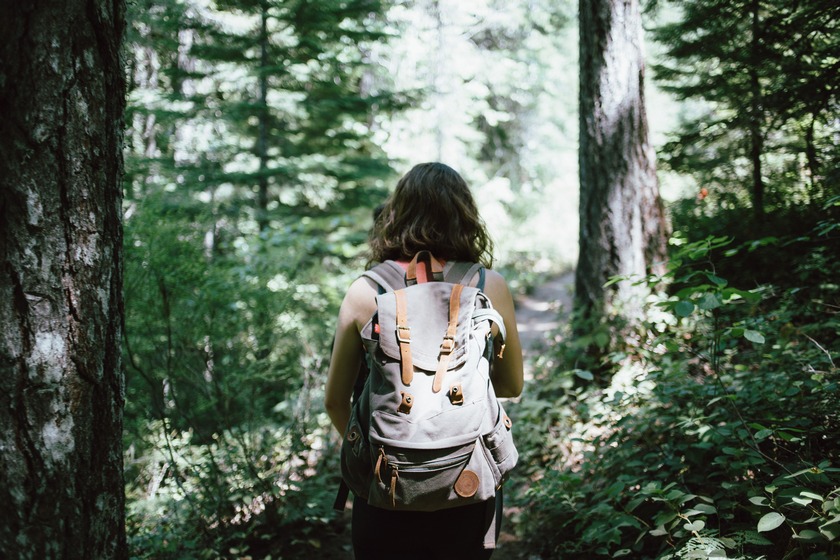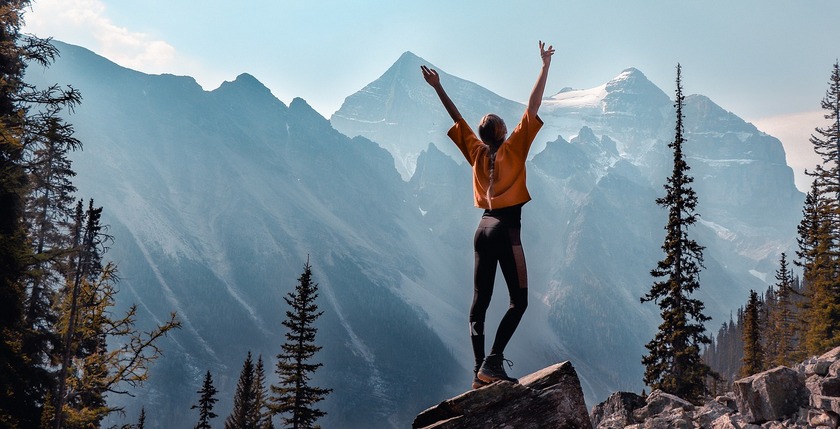Backpacking is a great way to feel closer to nature, move your body, and relax your mind. Unlike everyday life, your personal hygiene may not be a top priority when you’re in the woods. Hiking all day will have you working up a good sweat, so staying on top of your hygiene may feel like an uphill battle. But if your love of the outdoors is going to be a long term relationship, you’re going to have to keep up with your hygiene along the way.
Leave No Trace
Whether you’re an experienced backpacker or just starting out, you may have encountered the phrase “Leave no trace” before. This ideology basically means you pack out what you pack in, and you respect your environment - that includes everything from wildlife to minimising the damage of your campfire. This approach helps preserve the woods so everyone can continue to enjoy them for years to come.
When you’re deciding what to carry in your pack, it’s important to keep this ideology in mind. Unlike other vacations, you can’t throw away products as you use them. So if you’re accustomed to disposable hygiene products of any kind (think deodorant wipes, single use flossers, etc.), you’ll need to store those in your pack after you use them so you can bring them out of the woods with you when you’re done. You will want to rethink those disposable options and pack items you can reuse over and over.
Oral Hygiene
Some categories of hygiene are easier to leave no trace with than others. It’s easy to bring your deodorant stick in, and your deodorant stick right back out. But what about waste from other hygienic routines, like brushing your teeth? Being in the woods is no excuse to stop brushing twice a day, especially because all you need to do is tweak your routine slightly. Some hikers swallow their toothpaste, while others recommend a method called “eco-spraying”, which entails spitting the toothpaste almost like a sprinkler over a wide area. Without leaving a concentrated amount of toothpaste on one part of the ground, you can minimise any negative effects this foreign substance could have on the environment.
To further reduce your impact, consider using biodegradable toothpaste and a bamboo toothbrush, both of which are more environmentally friendly than conventional alternatives. According to this expert dentist in Seabrook NH, these options break down more easily and avoid contributing to plastic waste. Storing your brush in a ventilated, reusable container also helps keep it dry and clean without relying on disposable packaging.
To further reduce your impact, consider using biodegradable toothpaste and a bamboo toothbrush, both of which are more environmentally friendly than conventional alternatives. According to this expert dentist in Seabrook NH, these options break down more easily and avoid contributing to plastic waste. Storing your brush in a ventilated, reusable container also helps keep it dry and clean without relying on disposable packaging.
Makeshift Showers
When we’re hiking it’s easy to see a river or lake as the perfect place to wash up, but these bodies of water shouldn’t be contaminated with hygiene products - even biodegradable ones. It’s okay to scrub up in these water sources as long as you aren’t using any product. If you do want to use biodegradable soap, you can lather up a good distance away from the water source (200 feet or more), and use water bottles to rinse off.
Food or Fragrance?
Unlike normal everyday life, the primary issues with hygiene while backpacking have more to do with the scent of your products than the scent of your body odour. When you’re in the woods, you have to remember that you’re in the presence of wildlife. Bears in particular have a highly heightened sense of smell; but they can’t necessarily discriminate between a scented deodorant or a delicious meal. To a bear, most fragrances mean just one thing: food.
Most people aren’t interested in being confused for a bear entree, so it’s important to prioritise unscented products for your hygiene kit and follow trail guidelines for storage. Appropriate “food” storage varies depending on where you’re hiking. For example, when you’re hiking in the back-country or anywhere with a robust bear population, you may be required to store “food” (remember, that includes any scented products!) in food lockers, bear canisters, or bear bags. The key here is that none of these products should be with you in your tent. This way, if a creature comes to investigate the scent, they’ll be a safe distance away from you. Plus, animals can’t normally open those containers, so they should be right where you left them come morning. You obviously need to eat on your backpacking trip, so it’s not like there won’t be compelling scents in your camp anyway. If you properly store any fragrant items a safe distance from your tent, you should be perfectly safe.
Wrap Up: Hiking Hygiene Basics
Just like every aspect of backpacking, maintaining great (or let’s face it: even just passable) hygiene during your hikes takes some extra work. But that doesn’t mean you need to throw up your hands and surrender your health. With these workable strategies, you can safely backpack without sacrificing your hygiene, health, or the wilderness.
What about you, how do you stay clean whilst backpacking? Feel free to share any tips & advice below!















